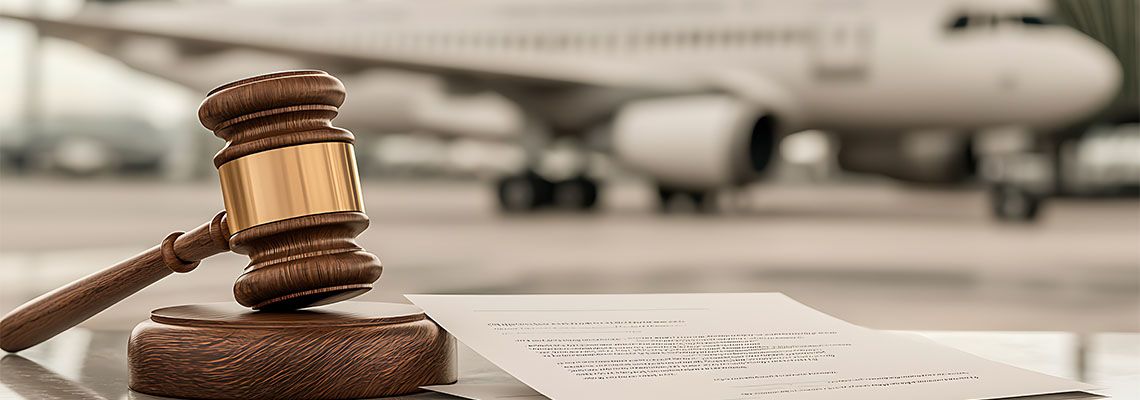Acquiring an aircraft for your business is a monumental step that can revolutionize your operations, improve efficiency, and even offer an edge in a competitive market. However, deciding whether to purchase or lease a plane is no small task.

How Can Aviation Companies Protect Their Intellectual Property in Business Transactions?
Protecting intellectual property (IP) in the aviation industry is essential for pilots, mechanics, and companies alike. Whether it's a new design, a proprietary maintenance process, or advanced aviation technology, safeguarding these innovations is critical for maintaining a competitive edge and securing long-term success.
Intellectual property theft or infringement can lead to financial loss, reputational damage, and missed growth opportunities—challenges that no aviation professional or business can afford to face. Protecting intellectual property in business transactions requires strategic foresight and comprehensive legal safeguards to mitigate risks such as infringement, theft, or misuse.
Aviation companies must safeguard their inventions, trade secrets, and branding when entering into contracts, forming partnerships, or engaging in other transactions.
At William G. Harger & Associates, PLLC, Attorney Bill Harger brings over 25 years of experience in aviation litigation and a unique perspective, having been a former pilot.
Headquartered in Richmond, Texas, just outside Houston, the firm proudly serves clients across Dallas, San Antonio, Austin, the United States, and worldwide.
By understanding the challenges faced by aviation businesses, the firm is well-positioned to help safeguard intellectual property in all types of business transactions. Here's what you need to know about protecting your intellectual property in business transactions.
The Importance of Intellectual Property in the Aviation Industry
The aviation industry continues to advance at a rapid pace, driven by groundbreaking technologies and innovative designs. This relentless innovation drives opportunities for growth, but also creates challenges in protecting the fruits of that innovation.
Intellectual property, ranging from patents and trademarks to trade secrets and technical data, represents a significant portion of an aviation company’s value. Mismanaging or neglecting to protect intellectual property (IP) can lead to lost revenue, legal disputes, and irreparable harm to one's reputation.
For companies engaging in business transactions, the stakes surrounding IP protection are even higher. Without adequate safeguards, confidential technical data or proprietary designs risk exposure, potentially leading to misuse or competitive threats.
Identifying Intellectual Property at Risk
The first step in protecting intellectual property in business transactions is identifying the IP that may be at risk. This could include patents for groundbreaking technologies, trade secrets such as unique manufacturing processes, or even branding assets like trademarks. While it may seem straightforward, identifying vulnerable IP can be complicated, especially when dealing with confidential information or collaborative agreements.
At this stage, guidance from a seasoned aviation attorney like Attorney Bill Harger can be invaluable. His decades of experience in aviation law enable him to assist clients in conducting thorough assessments of their intellectual property (IP) within the context of any business transaction.
Avoiding Common Pitfalls
Aviation companies often overlook vital aspects of IP protection during transactions. For example, they may fail to implement robust confidentiality agreements or properly document ownership rights. Attorney Harger can help companies avoid these pitfalls by drafting clear contracts, establishing protective mechanisms, and verifying compliance with applicable laws and regulations.
Crafting Clearly Defined Agreements
Contracts are the foundation of any business transaction, and nowhere is this more relevant than in protecting IP. Licensing agreements, for example, should specify the terms under which intellectual property will be used, who retains ownership rights, and what limitations are in place.
Similarly, non-disclosure agreements (NDAs) are critical for protecting sensitive information during the negotiation phases of a transaction. At William G. Harger & Associates, PLLC, Attorney Bill Harger crafts clear, concise agreements that reflect the unique needs of aviation companies. By addressing potential risks upfront, businesses can confidently enter transactions, knowing their intellectual property is safeguarded.
Conducting Comprehensive Due Diligence
Before entering any business transaction, aviation companies must conduct thorough due diligence to assess potential risks. This involves investigating the other party’s reputation, assessing their adherence to IP laws, and verifying the absence of any history of IP-related conflicts.
Comprehensive due diligence also entails assessing the value of one’s own intellectual property and understanding how it aligns with the transaction. Attorney Harger assists aviation companies across Texas, the United States, and internationally in managing these critical steps.
Handling International Transactions
For aviation companies conducting business on a global scale, intellectual property protection becomes doubly challenging. IP laws vary widely across countries; failure to account for these differences can leave a company vulnerable. International business deals require careful consideration of cross-border IP enforcement, jurisdictional differences, and potential trade implications.
Attorney Harger’s extensive experience working with international clients enables him to anticipate and effectively address these challenges. His firm helps aviation businesses protect their intellectual property, regardless of where transactions occur.
The Role of Legal Advocacy in Safeguarding IP
Legal advocacy helps protect intellectual property during business transactions. Sometimes disputes arise despite an aviation company’s best efforts to secure its IP. For example, another party may breach a licensing agreement or improperly use secured trade secrets. When such issues surface, having a trusted legal advocate is imperative.
William G. Harger & Associates, PLLC, gives aviation companies the support they need to resolve disputes effectively. With over two decades of experience and an in-depth understanding of aviation law, Attorney Harger provides the legal representation necessary to pursue favorable outcomes.
Why Reach Out to William G. Harger & Associates, PLLC?
Every business transaction involves an element of risk, but that risk can be mitigated with the proper legal guidance. Attorney Bill Harger brings a rare combination of skills to the table as both a seasoned lawyer and a former pilot. His deep understanding of the aviation industry, paired with his extensive legal experience, enables him to craft customized solutions tailored to the unique challenges faced by aviation companies.
Whether your business operates within Texas or spans international borders, William G. Harger & Associates, PLLC, works to cultivate trust and deliver actionable solutions for clients around the world.
Protecting intellectual property is not just about preserving value; it is also about safeguarding innovation and securing your company’s future. Aviation companies face enough challenges without the added risk of compromised IP.
By seeking legal counsel from William G. Harger & Associates, PLLC, you can enter business transactions with confidence. Call today to initiate the process of comprehensive intellectual property protection in Houston, Dallas, San Antonio, Austin, or anywhere in the United States or globally.
RECENT POSTS
Corporate aircraft are valuable assets that require meticulous care to operate safely, effectively, and in compliance with regulations. For aircraft owners, operators, and aviation businesses, it's not just about ensuring the aircraft remains airworthy but also about protecting the significant investments tied to these machines.
The aviation industry is a dynamic and complex sector, where businesses often collaborate to share resources, reduce costs, and expand their reach. One of the most effective ways to achieve these goals is through a joint venture. Whether it’s a partnership between airlines to streamline operations or a collaboration between manufacturers to develop cutting-edge aircraft technology, joint ventures play a pivotal role in shaping the industry.



